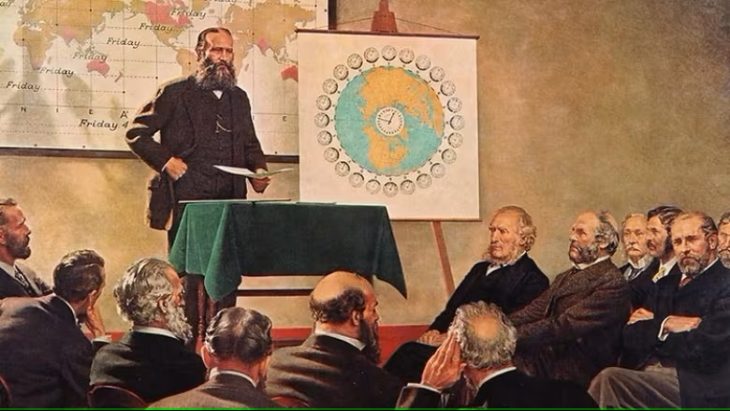
Word of the Day: Peripatetic
Today’s word of the day, courtesy of The Dictionary Project email, is peripatetic. It can be either an adjective or a noun, and both have two, connected meanings. The adjective means “walking or traveling about; itinerant” or, with a capital letter, “of or relating to Aristotle, who taught philosophy while walking in the Lyceum of ancient Athens” (https://www.dictionary.com/browse/peripatetic). The noun means “a person who walks or travels about” or, with a capital letter, “a member of the Aristotelian school.”
The noun entered the language in the “mid-15c., Peripatetik, ‘a disciple of Aristotle, one of the set of philosophers who followed the teachings of Aristotle,’ from Old French perypatetique (14c.) and directly from Medieval Latin peripateticus ‘pertaining to the disciples or philosophy of Aristotle,’ from Greek peripatētikos ‘given to walking about’ (especially while teaching), from peripatein ‘walk up and down, walk about,’ from peri ‘around, about’ (see peri-) + patein ‘to walk, tread’ (see find (v.)). Aristotle’s custom was to teach while strolling through the Lyceum in Athens.
“In English, the philosophical meaning is older than that of ‘person who wanders about’ (1610s). As an adjective, ‘walking about from place to place, itinerant,’ from 1640s, often with a tinge of humor” (https://www.etymonline.com/search?q=peripatetic). So we have another example of broadening in English.
On this date in 1879, at a meeting of the Canadian Institute, Scotch-Canadian engineer Sandford Fleming presented two papers, “Time Reckoning” and “Longitude and Time Reckoning” (https://en.wikipedia.org/wiki/Sandford_Fleming).
Born in Scotland in 1827, Sandford Fleming emigrated to Canada when he was jus 18. He settled in the town of Peterborough, Ontario, where he had some extended family. He had trained in Scotland as a surveyor, and he was able to continue that profession. In Peterborough he quickly became friends with the Hall family, and eventually married Jeannie Hall. They had a bunch of children, only two of whom died young. He went to work as a surveyor for the Grand Trunk Railway, and eventually he became an engineer for the Northern Railway of Canada.
Oddly, it was a train that led to the work that made Sandford Fleming a, well, not exactly a household name, but a person who should be remembered. First, here’s the background.
Before the late nineteenth century, there was no universal standard time. Each community set its clock according to the position of the sun in that community. If one were traveling, one would have to adjust to the local time, but that was not a real problem until the advent of the train. Trains made it possible to travel fast enough that it was confusing as to whether the schedule of the train was made by the community the traveler was leaving or that the traveler was traveling to. In 1847, the UK addressed the problem by establishing what it called Greenwich Mean Time—all communities were required to operate according to this time, standardizing the clock throughout England.
Then came Sandford Fleming. Fleming was traveling in Ireland when he missed a train because of confusion between AM and PM (AM means “ante-meridian” or “before the middle of the day,” and PM means “post-meridian” or “after the middle of the day”). Out of his frustration over missing the train, Fleming began working on universal time. He divided the world into 24 time zones using longitude. New time zones came with every 15º of eastward or westward movement.
Of course, the proposal went to a committee, and the International Meridian Conference in 1884 eventually approved a Universal Time based upon Fleming’s ideas. Initially, the conference said that the universal time should not interfere with local times, but eventually more and more countries adopted the Universal Time, which is now usually referred to as Greenwich Mean Time.
Living in the 21st century, it is hard to imagine a time when there was not a Universal Time. On Saturday mornings through the school year, I wake up to watch the English Premier League. I’m pretty confident about when games will be played because the UK is usually five hours ahead of the Eastern time zone. It can be a bit confusing right around the transition from standard time to daylight savings time and back, but not very confusing.
I’m thankful for the work of Sandford Fleming and the International Meridian Conference. I cannot imagine wandering around in a world without a universally agreed upon time.
Today’s image is from an article by Chris Chang-Yen Phillips for the Canadian Broadcasting Corporation’s website entitled “What might Canada been like without Sandford Fleming?” The “painting depicts his presentation of time zones. (Rex Woods/Deutsches Uhrenmuseum)” (https://www.cbc.ca/2017/what-might-canada-have-been-like-without-sandford-fleming-1.3983570).